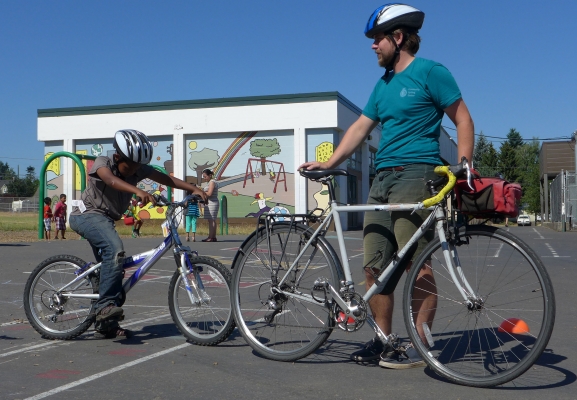Northeastern Universityís Peter Furth is known equally for his research in public transportation, bike planning and traffic signals. Furth brings his diverse interests to Portland for the holiday-shortened week of May 25th. On Tuesday, 5/26, there will be a seminar on his traffic signal priority work and on Wednesday, 5/27, there will be another seminar on his work regarding cycle tracks. In addition, Furth will have a variety of meetings with local transportation practitioners, including a bike tour by staff from the Portland Bureau of Transportation. The visit is co-sponsored by OTREC and IBPI. For more information about the seminars, visit PSU's Center for Transportation Studies.
Portland State University is committed to supporting research that is both regionally focused and globally relevant. This fall PSU has published a brochure featuring some of its exemplary research including OTREC sponsored projects by researchers Madeleine Pullman and Jennifer Dill. Dr. Pullman's research addresses the logistical issues raised by the rising demand for locally produced foods. She has studied supply chain success stories like that of Country Natural Beef, a cooperative family business committed to environmental responsibility, as well as other enterprises that have been slower to adopt such values, in order to better understand the impediments to change. Dr. Dill's research team has given GPS devices to bicycle commuters and collected rider surveys in order to collect data about the routes cyclists take, gender differences in riding and other information that can help cities better understand cyclistsí infrastructure needs. This regionally aimed research creates universal models of environmental responsibility and sustainability from which other cities can benefit.
On May 15, 2008, Jennifer Dill, Associate Professor in the Nohad A. Toulan School of Urban Studies and Planning and Director of the Center for Transportation Studies at Portland State University, participated in a congressional briefing in Washington, D.C. The briefing was sponsored by the Congressional Bike Caucus and the Active Living Research program of the Robert Wood Johnson Foundation on Biking Your Way to a Healthier Community. The Congressional Bike Caucus is chaired by Congressman Earl Blumenauer (OR) and Congressman Tom Petri (WI). Dr. Dill described her ongoing research of regional bike trips, tracked by GPS-equipped bicyclists. She notes that preliminary analysis shows that half of the bicycle riding happened on roads with bike lanes, off-street paths, or bicycle boulevards. She also briefly discussed policy implications and further research needs. Read Dr. Dill’s briefing here: Briefing.
Professor John Pucher, a car-less commuter from the Bloustein School of Planning and Public Policy at Rutgers University, was the first fall OTREC Visiting Scholar and CTS Seminar guest on September 28, 2007. His presentation, "Promoting Safe Walking and Cycling to Improve Public Health: Lessons from Europe," was standing room only, and the audience enjoyed his photos of bike-friendly features in cities across Europe. Pucher examined a range of public health impacts of our urban transport systems and argued that the current car dependence of American cities is responsible for enormous environmental harm, social isolation, lack of physical activity, and traffic dangers. He described how improving the convenience, safety, and attractiveness of walking and cycling in crucial to overcoming these negative impacts. Pucher discussed specific policies and programs used in Europe, and advocates their widespread adoption in American cities. A lively discussion with faculty, students and members of the Portland Bicycle Master Plan Committee followed the seminar.
The video begins at 0:23.
Abstract: The bike movement in the United States tends to support infrastructural changes to streets. Reshaping the built environment is expected to stimulate behavior changes in road users. At the same time, this approach may overlook the transportation cultures of existing urban communities and raise concerns about displacement and gentrification. Based on ethnographic research and advocacy experiments in Los Angeles, Lugo proposes the concept of "human infrastructure" to describe the ways that social relationships impact how people experience the built environment. By taking both physical and human infrastructure into account, transportation planners and advocates can make social justice a key part of sustainability.
View slides
Watch video:
The Community Cycling Center has been at the business of broadening access to bicycling for 22 years. Far before anyone was talking about "equity" in the world of bike commuting and advocacy, the Community Cycling Center was working directly with youth of color to make...
Read moreThe video begins at 0:39.
View slides
Summary: This presentation is a showcase of various GIS tools developed for bicycle network analysis and planning. The showcase includes a tool for assessing community-wide bikeability, a tool for forecasting bicycle volumes based on street topology, and a tool for evaluating different bicycle improvement plans in terms of exposure to danger situations for bicyclists. The tools will be demonstrated with case study data. The presentation will include a review of the Highway Capacity Manual Bicycle Level of Service and a discussion about using bicycle and pedestrian data collected through citizen-volunteer count programs.
Bio: Dr. Michael Lowry holds a joint appointment in Civil Engineering and Bioregional Planning at the University of Idaho. He is an affiliate researcher for the National Institute for Advanced Transportation Technology. His research focuses on capital investment decision-making and transportation planning for bicyclists and pedestrians. Dr. Lowry teaches courses related to sustainable transportation, engineering statistics, and economic analysis. He received his PhD in Civil and Environmental Engineering from the University of Washington and BS and MS from Brigham Young University.

